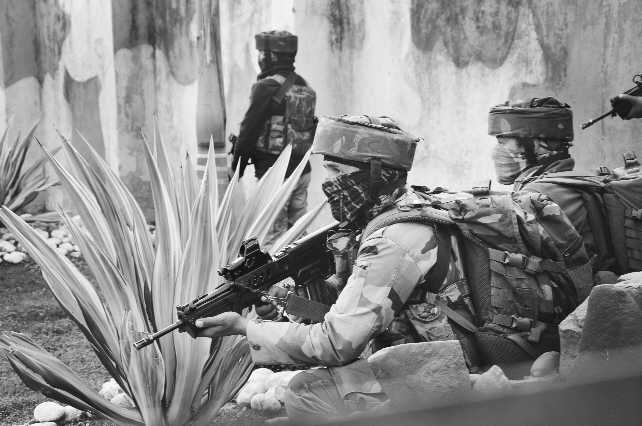Pincer attack in J&K
Amit Khajuria in Jammu
A segued and synopsized composition of what has happened in Jammu & Kashmir over the past few days offers very dangerous and unpredictable trends both in the aftermath of Sunjuwan Army camp attack (Feb 10-13) and Feb 16 brazen escape of militants following heavy stone-throwing amid a flush-out operation. Include a third attack by local militants on a CRPF camp (Feb 12-13). The conclusion is not far to seek: there is a sinister attempt to defame and demoralize the Army and security forces. There is another dimension: a fear — deviously exaggerated — about the communal fallout. The two prospects can make Pakistan extremely gleeful.
Security agencies probing the Sunjuwan attack seem unanimous that the terrorists were staying close to the Army camp and had a fairly good idea about the vulnerable points. Defence Minister Nirmala Sitharaman, too, said as much when she visited the residential campus inside the camp. “There was local support (to the terrorists). Pakistan will have to pay for this misadventure,” she said.
The state assembly was in session on February 10, when the Sunjuwan attack began. The BJP raised anti-Pakistan slogans blaming that country for sponsoring the assault. Amid slogan-shouting, National Conference MLA and former speaker of the House, Mohammad Akbar Lone, shouted ‘Pakistan zindabad’ slogans and walked up to the well of the House. Later he justified his slogans, saying his “religious sentiments as a Muslim were hurt.”
Speaker Kavinder Gupta almost blamed migrant — and in some case illegal — Rohingiya Muslims for having helped the terrorists plan the attack. “The Rohingiyas stay close to the camp,” he said. He was quickly countered by the National Conference and Congress members. The opposition MLAs said the Rohingiya Muslims were being singled out. They made the Speaker to “expunge” his remarks.
The demand for throwing Rohongiyas out of Jammu has gained ground post Sunjuwan attack. BJP spokesperson Virender Gupta has said that the Centre should take “all measures to repatriate Rohingiyas” from Jammu to Myanmaar. “If Kashmiri politicians are so keen on Rohingiyas, let them take these people to the Valley.” The PDP, the BJP’s ally, opposes it. “Any attempt or demand to shift them from Jammu is communally motivated,” said PDP spokesperson Rafi Mir.
Then came the Feb 16 encounter: a search operation in Baramulla’s Palhalan area in north Kashmir was called off after a mob pelted the security men with stones, enabling two militants to escape. This reflected the sad ground reality of the state government’s decision to free over 9,000 stone-throwers. They are now emboldened by the sympathy shown to them by political leaders. Chief Minister Mehbooba Mufti has said: “Withdrawal of FIRs against the stone-throwers is a right step in the right direction.”
Kashmiri leaders irrespective of party affiliations think that the violence in the state could end only by talking to Pakistan. “Talk to Pakistan… that can alone bring an end to the bloodshed. I don’t mind even if I am called anti-national for pursuing this line,” said the CM. Opposition National Conference toes the same line. Farooq Abdullah, three-time chief minister, wants dialogue because “war would be catastrophic.” Security officials say a point is missing in the dialogue discourse: “No one is questioning Pakistan for sponsoring terror.”
Those living in Jammu feel that they are faced with a situation where terrorists are getting all support, and that the acts of terror are being defended on communal lines. The increasing hostility between the two sides in J&K can be disastrous, warns a security expert.










